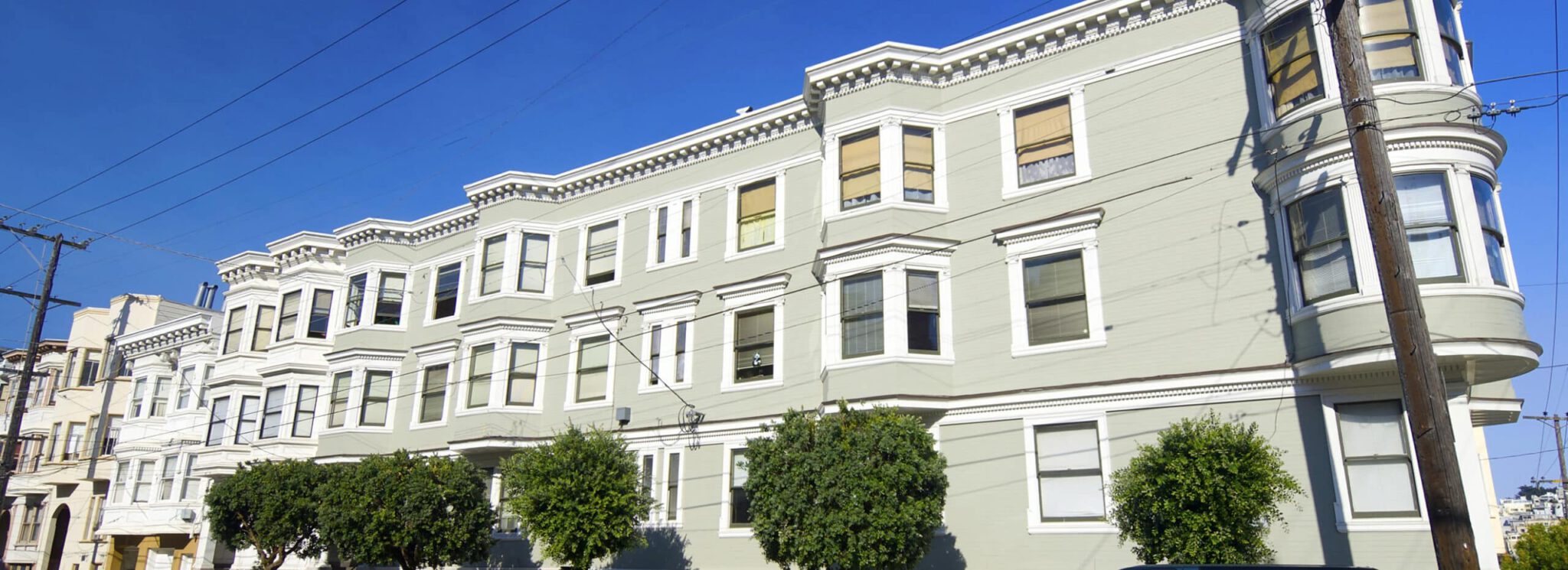Whether you’re an apartment property manager in California or elsewhere, you’ll want to know about the recently passed new statewide rent control law in California.. To battle the housing crisis and the 43 percent increase in homelessness in the last two years, California’s governor signed a bill to limit rent increases to a maximum of 5 percent per year plus inflation until Jan. 1, 2030. Additionally, it bans apartment property managers from evicting people without cause. They cannot throw out people for the opportunity to raise the rent for the next tenant.
Why does this matter to apartment property management outside of California? Sometimes lawmakers in other states learn from new laws and decide to pass a similar one of their own. In fact, Oregon has a similar law that caps rent increases.
Some properties that are now under the new rent control ordinance may need to look at more creative ways to multiply the net operating income and value of your apartment property. These also apply to those managing properties in Canada and states outside of California, but first, a look at what’s happening in California.
A Closer Look at California Rent Control Law
The news is not all bad for all California apartment properties. The new law does not apply in several instances, such as a property that is 15 years old or newer or to the 2 million residents who already have rent control. Still, the law affects 8 million out of the 17 million renters who spend more than a third of their income on rent.
For apartment properties
affected by the new law, here’s what it means. If you have an apartment unit that goes for $2,500 per month, the rent can only go up to $125 per month at the most.
In the past, apartment property management could increase the rent by more than $200. This change requires exploring different ways to increase your NOI. One caveat: Reducing expenses by cutting building services or doing the services yourself may affect your bottom line, but it will not count toward increasing the NOI when selling the property.
“Owners who are positioning their asset for sale should not assume that all savings on operating expenses in their buildings will necessarily equal an increase in NOI and therefore building value,” says Ramona Ursu on Real Estate News Exchange. “Instead, the best strategy is to allocate capital such that it influences either reducing expenses permanently, or increasing revenues.”
How to Cut Costs and Increase Revenue to Multiply NOI
The ways you can boost the NOI for your apartment property fall into two broad categories: reducing costs and growing revenue. It’s wise to do a review of all your costs on a regular basis to ensure you’re minimizing costs and eliminating them wherever possible. Here are 10 creative ways to explode your NOI.
1. Prevent bad debt
While you can’t kick someone out for no reason, you can evict someone who does not pay or causes damage. Better yet, help prevent those issues from happening by creating a stronger screening process to determine if someone is likely to be a good or bad tenant.
2. Cut water use
One of the largest expenses in apartment property management is water use. Install water-saving toilets, low-flow showerheads, and aerators on faucets. Replace central water tanks with a hot water system in each unit. Let the residents be responsible for paying their utility bills.
What is the landscaping like on your property? Does it require a lot of water? Switch to xeriscaping, which is landscaping that conserves water. You may not need sprinklers as much with xeriscaping. You don’t want the sprinklers going off on a rainy day, but you may not always be around to turn off the irrigation system and turn it back on. Instead, install sensors to take care of that for you.
3. Save on energy costs
For up to 80 percent energy savings, replace light bulbs with LEDs or CFLs. Do you have areas that don’t require 24/7 electricity? Install light and motion sensors to cut energy use.
You can find a lot of HVAC savings by doing quarterly inspections, preventive maintenance, changing air filters on a regular basis, and cleaning the unit’s pans and coils. Doing these also prolongs the life of the HVAC. Like with water, you can install a hot water system in each unit and pass on the responsibility of paying the bill to residents.
4. Bid out contracts
In addition to bidding out on new contracts, revisit current ones. Sometimes better services come along that provide more bang for your buck. If you want to keep the contractor, get estimates from competitors and use those estimates to renegotiate a new contract.
It’s tempting to go with the lowest bidder, but it’s not always better. Do a comparison of at least three bids to see which best fits your needs. Ask the contractor to explain the price of the bid. Another thing to review is your landscaping cost. Do you pay a monthly fee or per job? Landscapers most likely come out less often in the winter months and more in the summer months. A per job fee may provide cost savings in the long run.
5. Protest your property taxes
Cities may estimate properties on the higher end thinking the property manager will not contest them. It’s worth challenging the property tax each year — unless the city reduces its assessment — as it can lead to huge cost savings. You can hire a tax consultant to take this on for you as they can save you enough money to pay for their service and still come out ahead.
6. Revisit your insurance
You most likely have your insurance on auto-renewal. However, things and priorities change. For example, if you add a video surveillance system, this could cut your premiums. Tell the insurance carrier what steps you’ve taken for apartment security
and other factors that could affect the quote.
7. Reduce turnover costs
Calculate the cost of turnover to use as a benchmark. Knowing the turnover costs ensures you keep the incentives below that cost. You can use this to incentivize tenants to notify you when they intend to move out. This reduces turnover time because you’ll know when to begin the turnover process and start finding someone to move in.
One of the most effective ways to reduce turnover costs is to create and document the process. This covers inspection, repairs, and cleaning as well as pro-rating the rent when tenants move in early. While changing tenants may be an opportunity to increase the rent, it most likely pays more to keep a tenant than to find a new one with a cap on rent increases.
Systemize the move-in and move-out processes to minimize disagreements on the damage the tenant caused. Unclaimed damage is one of the biggest sources of lost revenue and this process will reduce that.
8. Maintain a strong curb appeal
Everything from landscaping to the swimming pool needs to remain clean, well-maintained, and inviting. No one wants to stay or move into an apartment building that looks run down and dirty. Do tenants feel safe walking around the property and to and from their vehicles? This helps reduce turnover, which costs more than a limited rent increase.
9. Invest in apartment amenities
You may find new profit centers in the apartment amenities
you offer. Perhaps, some can be an add-on while others have a separate monthly fee for the services the resident chooses. You could offer a handful of furnished apartment units for short-term rentals for tenants’ friends and families. They would stay in a short-term apartment rather than a hotel.
You can build recurring revenue by adding a laundry room, storage units, garages, vending machines, and in-unit washing machines and dryers, an on-site grocery store or coffee shop, cable, and internet service. You can use these as incentives to have someone sign or renew a lease.
10. Increase apartment security with video surveillance
Security can mean the difference between signing with your property or a competitor. Multiple studies show that everyone from millennials to baby boomers look for security features.
Parking lots and garages are a major security concern for tenants. People simply want to feel safe at home and moving around the apartment property. National Apartment Association says that Gen X and Baby Boomers prefer apartments with security systems.
When you have trained security operators watching your cameras, you can deter crime and help catch damage before it occurs. These trained operators know what to watch for to spot suspicious activity before anything happens. They can intervene by issuing an audio warning and calling law enforcement.
Another benefit of video surveillance is that people watching the cameras can spot and report safety hazards for residents using walkers, canes, or wheelchairs. It can also help reduce your insurance premiums because you show the insurer that you’ve taken steps to reduce your risk. Video surveillance can do all of this for just a fraction of the cost of a security guard.
Some tenants will not only live in your apartment building but also conduct business there. A Gallup survey reveals that more than 40 percent of Americans telecommute some of the time. Hence, it’s most likely many remote workers work in their apartments.
You’ll want to bid out for video surveillance services rather than take it on yourself. Your staff needs to focus on their primary jobs and customer service. If they split their attention between their jobs and watching the cameras, they will surely miss something on camera. Working with a qualified video surveillance company like Stealth will help maximize your security while minimizing your costs.
Video surveillance delivers a fast ROI and boosts your NOI. Besides, you give your tenants peace of mind that will encourage them to stay longer. Contact us to learn about apartment security solutions.
These 10 ways will amplify the NOI for your apartment property. It may sound overwhelming, but just pick one or two to start. And go from there. Document your baseline and do a little math to identify the best steps to take to grow your NOI regardless of your state’s rent control laws.

